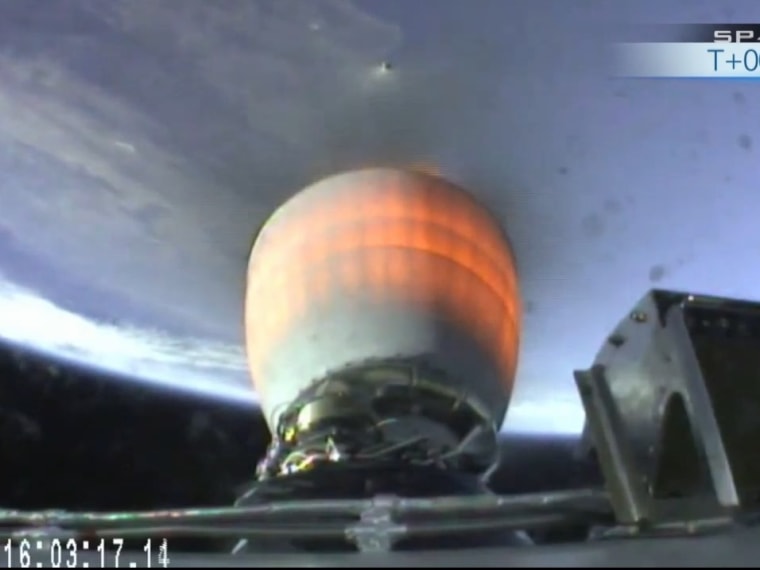The SpaceX launch company and its billionaire founder, Elon Musk, on Tuesday smacked down suggestions that the upper stage of its upgraded Falcon 9 rocket exploded after putting a half-dozen satellites in orbit.
"There was definitely no explosion of any kind." Musk told NBC News in an email. "Falcon 9 released all satellites safely in their intended orbits."
The suggestions were sparked by radar readings passed along by Space-Track.org, a database that monitors orbital objects ranging from satellites to space junk. SpaceX's Falcon 9 v1.1 rocket was launched for the first time from Vandenberg Air Force Base in California on Sunday, and released the Canadian space-weather satellite called Cassiope as well as five smaller payloads into pole-to-pole orbits.
"Normally, SpaceTrack would expect to be listing the six released satellite combinations, the rocket body and maybe a couple of debris items," British satellite-watcher Robert Christy reported on his Zarya blog. "A few hours after launch, the catalogue was showing 20 items in a scatter of orbit, indicating an explosion. One of the satellites may be the suspect but the most likely culprit is SpaceX's Falcon 9."
The claim was distributed widely by websites — to such an extent that SpaceX spokeswoman Emily Shanklin emailed a denial to reporters. She said "our data confirms there was no rupture of any kind on the second stage."
"Following separation of the satellites to their correct orbit, the Falcon 9 second stage underwent a controlled venting of propellants (fuel and pressure were released from the tank) and the stage was successfully safed," she said. "During this process, it is possible insulation came off the fuel dome on the second stage and is the source of what some observers incorrectly interpreted as a rupture in the second stage. This material would be in several pieces and be reflective in the Space Track radar. It is also possible the debris came from the student satellite separation mechanisms onboard."
Shanklin said "SpaceX will continue to review to help identify the source of the extra debris."
Musk offered a similar explanation in an email to Jay Barbree, NBC News' Cape Canaveral correspondent: "During venting to safe the stage, some foil insulation on the engine came loose. This is very lightweight, so will quickly re-enter and burn up, but it is reflective on radar."
Even before the claims about an explosion, the Falcon 9's venting procedure raised a hubbub because the resulting cloud of propellants sparked a wave of UFO reports from southern Africa as well as the Indian Ocean islands of Mauritius and Reunion.
More about SpaceX:
- SpaceX wins bid to launch Canadian radar satellites
- Hyperloop + Dragon + Grasshopper = Big week for Musk
- SpaceX's Grasshopper rocket flies sideways successfully
Alan Boyle is NBCNews.com's science editor. Connect with the Cosmic Log community by "liking" the NBC News Science Facebook page, following @b0yle on Twitter and adding +Alan Boyle to your Google+ circles. To keep up with NBCNews.com's stories about science and space, sign up for the Tech & Science newsletter, delivered to your email in-box every weekday. You can also check out "The Case for Pluto," my book about the controversial dwarf planet and the search for new worlds.
